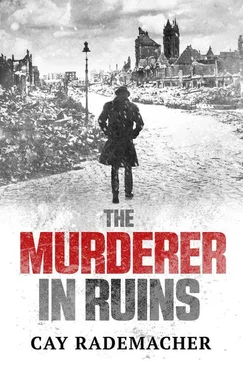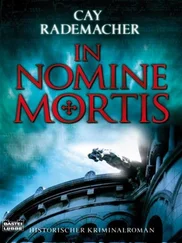Cay Rademacher - The Murderer in Ruins
Здесь есть возможность читать онлайн «Cay Rademacher - The Murderer in Ruins» весь текст электронной книги совершенно бесплатно (целиком полную версию без сокращений). В некоторых случаях можно слушать аудио, скачать через торрент в формате fb2 и присутствует краткое содержание. Год выпуска: 2015, ISBN: 2015, Издательство: Arcadia Books Limited, Жанр: Триллер, на английском языке. Описание произведения, (предисловие) а так же отзывы посетителей доступны на портале библиотеки ЛибКат.
- Название:The Murderer in Ruins
- Автор:
- Издательство:Arcadia Books Limited
- Жанр:
- Год:2015
- ISBN:9781910050750
- Рейтинг книги:5 / 5. Голосов: 1
-
Избранное:Добавить в избранное
- Отзывы:
-
Ваша оценка:
- 100
- 1
- 2
- 3
- 4
- 5
The Murderer in Ruins: краткое содержание, описание и аннотация
Предлагаем к чтению аннотацию, описание, краткое содержание или предисловие (зависит от того, что написал сам автор книги «The Murderer in Ruins»). Если вы не нашли необходимую информацию о книге — напишите в комментариях, мы постараемся отыскать её.
The Murderer in Ruins — читать онлайн бесплатно полную книгу (весь текст) целиком
Ниже представлен текст книги, разбитый по страницам. Система сохранения места последней прочитанной страницы, позволяет с удобством читать онлайн бесплатно книгу «The Murderer in Ruins», без необходимости каждый раз заново искать на чём Вы остановились. Поставьте закладку, и сможете в любой момент перейти на страницу, на которой закончили чтение.
Интервал:
Закладка:
The truth is I know nothing at all about Maschke, Stave thought to himself when he finally reached his own front door. Maybe it’s time I looked into that. Tomorrow. After a few hours’ sleep.
The following afternoon Stave had the first opportunity to find the answers to a few questions – and almost completely screwed up.
They were discussing the case in his office. He was staring at the snowflake patterns on the ice on his window, glinting like cold stars, while MacDonald was going over their next steps. The lieutenant was leafing through yellow pages looking at names, descriptions and dates of birth. Hundreds of them as far as Stave could see.
‘This is a copy of the Hamburg missing persons list,’ MacDonald said. ‘I’ve gone through all the names – and there is no one there who fits either of our two victims. There are, of course, young women and old men, but their descriptions do not match either of the two. Nor can I find any pattern in the lists. Missing men, women and children. People unaccounted for since the bombings, people lost amongst the stream of refugees fleeing the east, or just gone missing because that is the way things are after a war. There are cases of husbands or wives reported missing, relatives and friends, employees reported missing by their firms or offices. If any of them should have ended up amidst the rubble with strangulation marks on their throat, I have no idea how we should find out their names from what we have here.’ MacDonald folded the list up and put it in his uniform jacket pocket. Then he raised his hands in apology.
‘Same thing here,’ said Maschke, his tone of voice sounding as if it made him furious not to have found something the Brit had missed. ‘No dentist ever examined this old boy’s choppers, and no doctor ever examined him down below.’
MacDonald gave him a querying look and he smirked.
‘I mean his rupture was never treated by any hospital or dear old family doctor in Hamburg, that’s pretty much for certain.’
‘Maybe he was treated by a doctor who didn’t survive the war?’ Stave suggested.
‘I went round to the Street Clearance and Rebuilding office too,’ Maschke continued, flicking open a grubby notebook. ‘Did you know that in Hamburg more than 250,000 apartments and houses were destroyed by bombs? As well as 3,500 offices, 277 schools, 24 hospitals, 58 churches, and that altogether there are 43 million cubic metres of rubble. The rubble boys are pretty proud of their statistics department.’
‘That’ll keep them in work for the next 20 years,’ Stave said morosely. ‘But what’s it got to do with looters?’
‘It just shows that there’s a lot of opportunity. But the rubble boys say there are no turf wars between gangs looting treasures from the ruins. At least not at the moment. Since it’s been so cold, the stones, concrete slabs and all the dirt around have been frozen solid so that it’s hardly worth it for the professionals to go out hunting for booty. They’re waiting for the thaw. At present there are only amateurs out there amongst the ruins, looking for a metre of stovepipe, an oven plate or firewood. Too few of them to get into each other’s way. Fewer looters out there than there were a couple of months ago, and almost no incidents of fighting between looters. Whatever happened to the girl and the old man, it almost certainly had nothing to do with looting.’
‘Great,’ said Stave, before he realised what a stupid thing it was to say. He sighed and rubbed his forehead. He could do with an aspirin, he thought, but you had to go to the black market to get those.
MacDonald finished up for the day. Stave held back his vice squad colleague under the pretext that he wanted further details about what he had found at the Clearance and Rebuilding office.
‘What else is there to say?’ Maschke asked, when the Brit had left the room.
‘Just routine,’ Stave replied – the phrase that put the wind up every criminal – and not a few police too.
‘Is something wrong?’
Stave could have kicked himself. He forced a smile and then quickly carried on. ‘I’ll get straight to the point, Mashcke. This sort of investigation isn’t exactly your speciality. And you haven’t been at the job all that long.’
Maschke nodded, only partly mollified.
Stave pretended to examine Maschke’s notes, but obviously there was nothing of any interest. ‘You graduated from the police academy in 1946?’ he asked, trying to sound as if he was just making small talk. ‘When you were training did you do a stint with each of the city departments? In my day that was compulsory, although obviously we didn’t have the Street Clearance and Rebuilding department back then.’
Maschke tried to nod and shake his head at the same time, then gave up and said, ‘Yes, I graduated in ’46, but no, I have never seen inside most of the city departments. But I’m not sure it’s any great loss.’
‘What did you do before police training college?’ Stave asked, handing him his notebook back. It was a harmless enough question, he thought. But Maschke flinched, as if Stave had made him some immoral proposition. He blushed and there was a nervous tick in his right eye.
Stave caught his breath. He’d been too direct.
But a second later Maschke smiled, as if embarrassed, waved his hand in the air and mumbled, ‘What did I do? I was in the armed forces, the navy, on the U-boats. In France. Sent straight to France in 1940, to the U-boat bases on the Atlantic. Out of France in 1944. But in between, trips out of Brest on the U-boat and a month’s leave every now and then. Un temps pas mal, meme pour un boche comme moi. At least I managed to polish my school French. I got to know my red wines too, not that that’s much good at the moment.’ He laughed.
Stave squeezed out a smile. ‘Good work,’ he said, nodding at the notebook. ‘See you soon.’
He had heard his share of U-boat stories: damp in the close confines of a steel hull, endless patrols in the icy Atlantic. Depth charges that shook the subs from tail to stern. Floating coffins. Most U-boat sailors never came home. All of a sudden he looked at Maschke through different eyes: his constant, nervous smoking. The typical beard of a U-boat man with no means of shaving for weeks on end. His brutal impatience during the interrogation the night before. His superficial cynicism. Living at home with his mother – a sense of security.
After Maschke left, the chief inspector nonetheless made a call to an old friend in the personnel department, who owed him a favour. At least now he had concrete details about Maschke to go on.
Five minutes later he slammed down the receiver: it was quite clear that not only had Maschke never been in the Gestapo, he had never worked for any branch of the Hamburg police prior to 1945. He had applied to CID after the war and been signed up for police training college as he said. And, yes, in the papers submitted with his application there was a CV and documents to confirm his service on the U-boats in France. No Gestapo history, no time spent with the ‘special units’ in the east, no hidden years as a concentration camp guard. Maschke was clean.
On Friday Dr Ehrlich called him in. ‘The raid saw us catch a good few fish in the net,’ the public prosecutor began, politely, sitting back in his chair and putting his hands together over his stomach.
‘Unfortunately not the ones we were fishing for,’ the chief inspector replied. Stave wasn’t interested in metaphors; it was time to tackle the main topic.
‘I have to say I have no ideas,’ Ehrlich admitted. ‘If I were in your position, Stave, I would have done the same. And I wouldn’t have a clue what to do now.’
Just what I wanted to hear, the chief inspector thought. ‘We’re following up a couple of leads,’ he said.
Читать дальшеИнтервал:
Закладка:
Похожие книги на «The Murderer in Ruins»
Представляем Вашему вниманию похожие книги на «The Murderer in Ruins» списком для выбора. Мы отобрали схожую по названию и смыслу литературу в надежде предоставить читателям больше вариантов отыскать новые, интересные, ещё непрочитанные произведения.
Обсуждение, отзывы о книге «The Murderer in Ruins» и просто собственные мнения читателей. Оставьте ваши комментарии, напишите, что Вы думаете о произведении, его смысле или главных героях. Укажите что конкретно понравилось, а что нет, и почему Вы так считаете.











